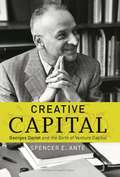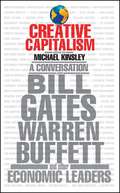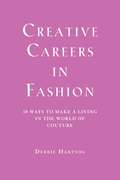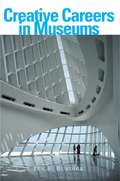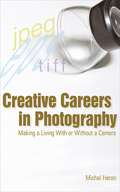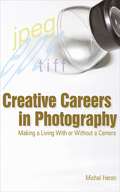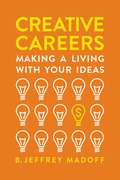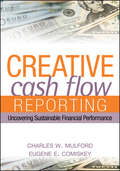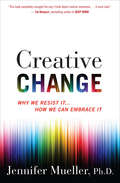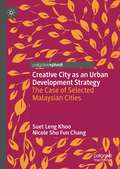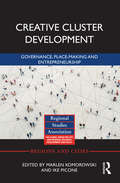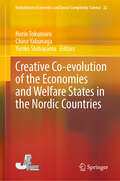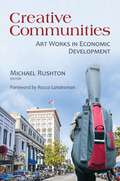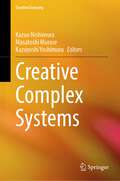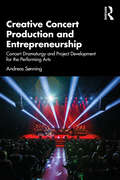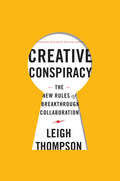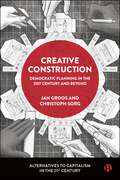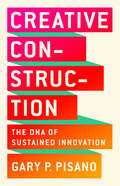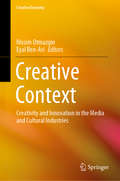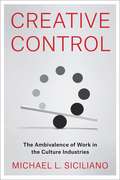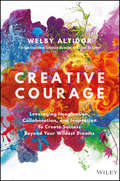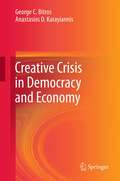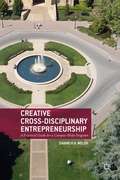- Table View
- List View
Creative Capital
by Spencer E. AnteVenture capitalists are the handmaidens of innovation. Operating in the background, they provide the fuel needed to get fledgling companies off the ground--and the advice and guidance that helps growing companies survive their adolescence.In Creative Capital, Spencer Ante tells the compelling story of the enigmatic and quirky man--Georges Doriot--who created the venture capital industry. The author traces the pivotal events in Doriot's life, including his experience as a decorated brigadier general during World War II; as a maverick professor at Harvard Business School; and as the architect and founder of the first venture capital firm, American Research and Development. It artfully chronicles Doriot's business philosophy and his stewardship in startups, such as the important role he played in the formation of Digital Equipment Corporation and many other new companies that later grew to be influential and successful.An award-winning Business Week journalist, Ante gives us a rare look at a man who overturned conventional wisdom by proving that there is big money to be made by investing in small and risky businesses. This vivid portrait of Georges Doriot reveals the rewards that come from relentlessly pursuing what-if possibilities--and offers valuable lessons for business managers and investors alike.
Creative Capitalism: A Conversation with Bill Gates, Warren Buffett, and Other Economic Leaders
by Michael Kinsley Conor ClarkeBill Gates is more than the world's most successful capitalist; he's also the world's biggest philanthropist. <P> Gates has approached philanthropy the same way he revolutionized computer software: with a fierce ambition to change the rules of the game. That's why at the 2008 annual meeting of the World Economic Forum in Davos, Switzerland, Gates advocated a creative capitalism in which big corporations, the distinguishing feature of the modern global economy, integrate doing good into their way of doing business. <P> This controversial new idea is discussed and debated by the more than forty contributors to this book, among them three Nobel laureates and two former U.S. cabinet secretaries. Edited by author and columnist Michael Kinsley, Creative Capitalism started as a first-of-its-kind online conversation that brought together some of the world's best minds to engage Gates's challenge. From Warren Buffett, who seconds Gates's analysis, to Lawrence Summers, who worries about the consequences of multiple corporate objectives, the essays cover a broad spectrum of opinion. Judge Richard Posner dismisses Gates's proposal as trumped-up charity that will sap the strengths of the profit-maximizing corporation, while journalist Martin Wolf maintains that the maximization of profit is far from universally accepted, and rightly so. Chicago Nobel laureate Gary Becker wonders whether altruistic companies can survive in a competitive economy, while Columbia Nobel laureate Edmund Phelps argues that a little altruism might be the right prescription for a variety of market imperfections. <P> Creative Capitalism is not just a book for philanthropists. It's a book that challenges the conventional wisdom about our economic system, a road map for the new global economy that is emerging as capitalism adapts itself once again to a changing world.
Creative Careers in Fashion: 30 Ways to Make a Living in the World of Couture
by Debbie HartsogWant to become a fashionista--for real? Get this book! Fun and entertaining, Creative Careers in Fashion reveals how the fashion industry works--and explores the vast range of career opportunities in the field. Focusing on the most creative jobs, including accessory, costume, and fashion design, as well as make-up artists, wardrobe consultants, textile designers, and colorists, this book showcases the practical information that will help readers find the perfect job and get it. Included are details on salary ranges, educational and experience requirements, where jobs are located, and new trends. Cameo interviews with real-life fashion professionals offer insider tips. Comprehensive, practical, and inspiring, Creative Careers in Fashion is the complete guide to finding a new career in an exciting industry. * Start a new career with help from industry insiders * Dozens of creative careers for students, career changers, anyone looking for their new parachute * Resources include detailed school and college listings.
Creative Careers in Museums
by Jan E. BurdickWhat kinds of jobs are available in museums? How do museums work? What opportunities are there in museum research and collection, preserving and cataloging, exhibiting and interpreting, publicity, administration, event planning, catering, support? Creative Careers in Museums answers all these questions and many more, with full information on how everyone can pinpoint and showcase their existing skills--then turn those skills into a dream job at a museum or other cultural institution. Interviews with people who have made career transitions into the field are packed with practical and inspiring ideas, and there's even information on starting new museums. Advice on targeting potential employers, putting together a resume, interviewing, and landing the job, plus an extensive resource list, make this the perfect starting point for anyone who wants to work in a museum.
Creative Careers in Photography: Making a Living With or Without a Camera
by Michal HeronHeron, a freelance photographer of three decades, offers details on the diverse paths available to aspiring career photographers. Jobs considered fall under one of stock categories: publication, consumer, service, digital, stock, or fine art photography, each of which is complemented by an interview with a practitioner. Also addressed are non-camera photography careers such as buying and dealing, representing, and writing or teaching. Advice mainly comprises job and equipment descriptions-- the author forgoes speculations on employment and salary outlook. The book concludes with advice on career building and self-marketing and a list of institutions teaching photography and professional organizations for photographers. Annotation ©2007 Book News, Inc. , Portland, OR (booknews. com)
Creative Careers in Photography: Making a Living with or Without a Camera
by Michal HeronFind the right job in photography. For anyone who loves working with photographs, here is a comprehensive guide to turning that passion into a career. Author Michal Heron, a veteran photographer, reveals the full range of possibilities, from shooting pictures to jobs that don't even require a camera. Corporate settings, editorial, media/audio-visual, fine arts, buying and selling, support services, set and location services, computer imaging, gallery and museum, teaching, writing, and many other career choices are presented. Readers will learn to assess their motivations, pinpoint their favorite areas of photography, explore lifestyle choices, understand required skills, and ultimately find the area of the industry that best matches their talents and their goals. Extra resources include listings for photography schools and professional organizations. Anyone looking for that perfect niche in the rich and rewarding photographic field will need this comprehensive book. Examines dozens of career possibilities-many that don't require a camera Self-assessment tools to pinpoint the perfect job, plus school and organization listings
Creative Careers: Making a Living with Your Ideas
by B. Jeffrey MadoffEarn a Living Doing What You LoveFeaturing insider advice from Daymond John, Karlie Kloss, Tim Ferriss, Randi Zuckerberg, Dave Asprey, Dennis Crowley, Brandon Maxwell, Mauro Porcini, Joy-Ann Reid, Roy Wood Jr., and dozens more!In one of the most popular classes at Parsons School of Design, B. Jeffrey Madoff gave students a reality check: "Most of us have had the feeling of 'I could've done that,' whether at an art gallery, watching a performance, or finding a new product or even a new business idea. What's the difference between you and them? They actually did it. You didn't." With Creative Careers, you will learn how to do it, too: use your creativity; have a sustainable, profitable career; and do what you love.Creative Careers pulls from interviews with more than forty experts--notable entrepreneurs, artists, and business leaders--as well as from Madoff's own decades of experience to supercharge your career. Creativity can often feel sporadic and unfocused, coming in bursts and peaks. That's why Madoff focuses your professional path by asking vital questions that will ultimately help you: Determine your valueBe smart about your hustleRuthlessly edit down your creative projectsOvercome fear and doubtCreate a successful, long-lasting career on your own termsYou may aspire to join the fashion world, to work in visual arts, or to spearhead a start-up. You may be an executive who leads a creative team, or a professional looking to make a career change. Madoff takes you down an accessible path that will lead to success in any field or endeavor.
Creative Cash Flow Reporting
by Charles W. Mulford Comiskey Eugene E.Successful methodology for identifying earnings-related reporting indiscretions Creative Cash Flow Reporting and Analysis capitalizes on current concerns with misleading financial reporting on misleading financial reporting. It identifies the common steps used to yield misleading cash flow amounts, demonstrates how to adjust the cash flow statement for more effective analysis, and how to use adjusted operating cash flow to uncover earnings that have been misreported using aggressive or fraudulent accounting practices. Charles W. Mulford, PhD, CPA (Atlanta, GA), is the coauthor of three books, including the bestselling The Financial Numbers Game: Identifying Creative Accounting Practices. Eugene E. Comiskey, PhD, CPA, CMA (Atlanta, GA), is the coauthor of the bestselling The Financial Numbers Game: Identifying Creative Accounting Practices.
Creative Change: Why We Resist It . . . How We Can Embrace It
by Jennifer Mueller&“This book completely changed the way I think about creative innovation. . . . A must read&” (Cal Newport, bestselling author of Deep Work). Business leaders say they want creativity and need real innovation in order to thrive. But according to startling research from management professor Jennifer Mueller, these same leaders chronically reject creative solutions, even as they profess commitment to innovation. Mueller&’s research reveals that it&’s not just CEOs but educators, parents, and other social trendsetters who struggle to accept new and creative ideas. Mueller parses the tough questions these findings raise. Do we all have an inherent prejudice against creative ideas? Can we learn to outsmart this bias? Creative Change combines analysis of the latest research with practical guidance on how to shift your mindset, and offers a wealth of counterintuitive recommendations to help you embrace the creative ideas you want. &“If we all crave creativity so much, why do we reject new ideas so often? Jen Mueller&’s smart new book unravels this puzzle.&” —Daniel H. Pink, New York Times–bestselling author of When and Drive &“Mueller, an accomplished scholar in the management field, has developed a well-formulated argument for creativity. Her ideas and research need to be available to academics, business practitioners, and, really, everyone.&” —Library Journal
Creative City as an Urban Development Strategy: The Case of Selected Malaysian Cities
by Suet Leng Khoo Nicole Shu ChangThis book is a pioneering work to position the creative city concept within Malaysian urban development discourse. The chapters are written and systematically sequenced to be all-encompassing and comprehensible to audiences both from the academic and non-academic realms. The nascency of creative city development in Malaysia has motivated the timely exploration of the viability of this strategy for selected Malaysian cities (i.e. Kuala Lumpur, George Town, Ipoh, Johor Bahru). The book also discusses the global discourse on creative city and its critiques. This is followed by an overview of Malaysia’s macrolevel socio-economic and political structures as well as national policies to frame the Malaysian creative city narrative. The case study chapters are novel, as each Malaysian city unravels its unique experiences and dissects the way the city responds to the creative city agenda amidst local nuances and idiosyncrasies.
Creative Cluster Development: Governance, Place-Making and Entrepreneurship (Regions and Cities)
by Marlen Komorowski Ike PiconeIn recent decades, the importance of creative cluster development has gained increasing recognition from national and regional governments. Governments have been investing in initiatives and urban development plans that aim to create or support localized creative industries. Our understanding of creative clusters is expanded with this insightful volume, which looks at issues of governance, place-making and entrepreneurship. In addition to its theoretical contributions, the book also presents a rich range of international case studies, including, among others, an analysis of coworking spaces in Toronto, business park development in MediaCityUK and mediapark.brussels and public–private partnerships in Warsaw. Creative Cluster Development will be valuable reading for advanced students, researchers and policymakers in urban planning, regional studies, economic geography, innovation studies and the creative and cultural industries.
Creative Co-evolution of the Economies and Welfare States in the Nordic Countries (Evolutionary Economics and Social Complexity Science #32)
by Norio Tokumaru Chino Yabunaga Yuriko ShibayamaThis book analyses the changes of welfare states, examining their sustainability enabled by innovative adaptations. On the basis of evolutionary social sciences, the authors understand the welfare states as complex adaptive systems, in which the actors’ perceptions, strategies and behaviours change in adaptive manners, which results in institutional changes. From this perspective, the dynamics of Nordic welfare states, mainly Finland as the Nordic welfare state under the greatest pressure to adapt, is analysed from the multiple perspectives of history, politics, economics and social policy. Through these analyses, the authors show that the long-term changes in welfare states can be creative evolutionary processes in which the experiences, cognitive frameworks, resources and capacities of different actors allow for diverse responses and, as a result of interaction, diverse outcomes. The book also illustrates the historical processes of welfare states’ formation that have created the human and social resources and capabilities that enable innovative responses today.
Creative Communities
by Rocco Landesman Michael RushtonUrban and regional planners, elected officials, and other decisionmakers are increasingly focused on what makes places livable. Access to the arts inevitably appears high on that list, but knowledge about how culture and the arts can act as a tool of economic development is sadly lacking. This important sector must be considered not only as a source of amenities or pleasant diversions, but also as a wholly integrated part of local economies. Employing original data produced through both quantitative and qualitative research, Creative Communities provides a greater understanding of how art works as an engine for transforming communities."Without good data and analysis-much of it grounded in economic theory-we cannot hope to strengthen communities through the arts or to achieve any of the other goals we set for the National Endowment for the Arts, the largest nationwide funder of the arts." -from the Foreword by Rocco LandesmanContributors: Hasan Bakhshi (Nesta UK), Elisa Barbour (University of California, Berkeley), Shiri M. Breznitz (Georgia Institute of Technology), Roland J. Kushner (Muhlenberg College), Rex LaMore (Michigan State University), James Lawton (Michigan State), Neil Lee (Nesta UK), Richard G. Maloney (Boston University), Ann Markusen (University of Minnesota), Juan Mateos-Garcia (Nesta UK), Anne Gadwa Nicodemus (Metris Arts Consulting), Douglas S. Noonan (Indiana University-Purdue University Indianapolis), Peter Pedroni (Williams College), Amber Peruski (Michigan State), Michele Root-Bernstein (Michigan State), Robert Root-Bernstein (Michigan State), Eileen Roraback (Michigan State), Michael Rushton (Indiana University), Lauren Schmitz (New School for Social Research), Jenny Schuetz (University of Southern California), John Schweitzer (Michigan State), Stephen Sheppard (Williams College), Megan VanDyke (Michigan State), Gregory H. Wassall (Northeastern University)
Creative Communities: Art Works in Economic Development
by Rocco Landesman Michael RushtonUrban and regional planners, elected officials, and other decisionmakers are increasingly focused on what makes places livable. Access to the arts inevitably appears high on that list, but knowledge about how culture and the arts can act as a tool of economic development is sadly lacking. This important sector must be considered not only as a source of amenities or pleasant diversions, but also as a wholly integrated part of local economies. Employing original data produced through both quantitative and qualitative research, Creative Communities provides a greater understanding of how art works as an engine for transforming communities."Without good data and analysis--much of it grounded in economic theory--we cannot hope to strengthen communities through the arts or to achieve any of the other goals we set for the National Endowment for the Arts, the largest nationwide funder of the arts." --from the Foreword by Rocco Landesman. Contributors: Hasan Bakhshi (Nesta UK), Elisa Barbour (University of California, Berkeley), Shiri M. Breznitz (Georgia Institute of Technology), Roland J. Kushner (Muhlenberg College), Rex LaMore (Michigan State University), James Lawton (Michigan State), Neil Lee (Nesta UK), Richard G. Maloney (Boston University), Ann Markusen (University of Minnesota), Juan Mateos-Garcia (Nesta UK), Anne Gadwa Nicodemus (Metris Arts Consulting), Douglas S. Noonan (Indiana University-Purdue University Indianapolis), Peter Pedroni (Williams College), Amber Peruski (Michigan State), Michele Root-Bernstein (Michigan State), Robert Root-Bernstein (Michigan State), Eileen Roraback (Michigan State), Michael Rushton (Indiana University), Lauren Schmitz (New School for Social Research), Jenny Schuetz (University of Southern California), John Schweitzer (Michigan State), Stephen Sheppard (Williams College), Megan VanDyke (Michigan State), Gregory H. Wassall (Northeastern University)
Creative Complex Systems (Creative Economy)
by Kazuo Nishimura Masatoshi Murase Kazuyoshi YoshimuraIn recent years, problems such as environmental and economic crises and pandemics caused by new viruses have been occurring on a global scale. Globalization brings about benefits, but it can increase the potential risks of “systemic problems”, leading to system-wide disruptions. The coronavirus pandemic, declared on March 11, 2020, by the World Health Organization, has revealed social disparities in the form of a higher risk of death for people of low-socioeconomic status and has caused massive destruction of the economy and of globalization itself. Extensive efforts to cope with these challenges have often led to the emergence of additional problems due to the chain of hidden causation. What can be done to protect against such emerging challenges? Despite the resulting complexity, once these individual problems are considered as different aspects of a single whole, seemingly contradictory issues can become totally understandable, as they can be integrated into a single coherent framework. This is the integrationist approach in contrast to the reductionist approach. Situations of this kind are truly relevant to understanding the question, “What are creative complex systems?” This book features contributions by members and colleagues of the Kyoto University International Research Unit of Integrated Complex System Science. It broadens our outlook from the traditional view of stability, in which global situations are eventually stabilized after the impact of destruction, to “creative” complex systems.
Creative Concert Production and Entrepreneurship: Concert Dramaturgy and Project Development for the Performing Arts
by Andreas SonningCreative Concert Production and Entrepreneurship: Concert Dramaturgy and Project Development for the Performing Arts offers a conceptual and applied introduction to the musical and dramaturgical challenges involved in developing and producing concerts. Drawing from over three decades of real-world experience and a range of international case studies, the author explores new models for cooperation between artists, cultural institutions, governments, and businesses, arguing for the importance of rooting the concert production process in artistic and ethical values. The book presents essential knowledge and techniques to meet the demand for music and stage performances across genres, arenas, formats, and distribution channels. Relevant to a wide range of students and professionals in music and the performing arts, Creative Concert Production and Entrepreneurship marries theory with practice, providing a framework for readers to develop the creative entrepreneurial practices essential for success in today’s music industry.
Creative Confidence: Unleashing the Creative Potential Within Us All
by Tom Kelley David KelleyIDEO founder and Stanford d.school creator David Kelley and his brother Tom Kelley, IDEO partner and the author of the bestselling The Art of Innovation, have written a powerful and compelling book on unleashing the creativity that lies within each and every one of us.Too often, companies and individuals assume that creativity and innovation are the domain of the "creative types." But two of the leading experts in innovation, design, and creativity on the planet show us that each and every one of us is creative. In an incredibly entertaining and inspiring narrative that draws on countless stories from their work at IDEO, the Stanford d.school, and with many of the world's top companies, David and Tom Kelley identify the principles and strategies that will allow us to tap into our creative potential in our work lives, and in our personal lives, and allow us to innovate in terms of how we approach and solve problems. It is a book that will help each of us be more productive and successful in our lives and in our careers.
Creative Conspiracy
by Leigh ThompsonEmbracing the Counterintuitive Side of CollaborationThink of your to-do list at work. Chances are the most important tasks require you to work with others-and the success of those endeavors depends on the effectiveness of your collaboration.According to management expert Leigh Thompson, collaboration that is conscious, planned, and focused on generating new ideas builds excitement and produces what she calls a "creative conspiracy." Teams that conspire to organize themselves, motivate one another, and combine their talents to meet creative challenges are the hallmark of the most successful organizations.In this book, Thompson reveals the keys to the kind of collaboration that allows teams to reach their full creative potential and maximize their results. She also reveals a host of surprising findings; for example: Left to their own devices, teams are less creative than individuals Providing "rules" to teams actually increases inventiveness Striving for quality results in less creativity than striving for quantity Fluctuating membership enhances a team's innovation Most leaders cannot articulate the four basic rules of brainstormingThompson combines broad-ranging research with real-life examples to offer strategies and practices designed to help teams and their leaders capitalize on what actually works when it comes to creative collaboration. Creative Conspiracy challenges managers to adopt an unconventional approach to leading teams that, done right, will lead to the creative success of every team-and every organization.
Creative Construction: Democratic Planning in the 21st Century and Beyond (Alternatives to Capitalism in the 21st Century)
by Jan Groos and Christoph SorgDemocratic planning allows us to effectively address the multiple crises of our time through cooperative modes of collective coordination. Given the destructive consequences of contemporary capitalism, such a structural alternative to market economies is needed more than ever. This accessible work examines various approaches that theorise, practise and nurture a creative construction towards varieties of democratic planning. Drawing from current socio-economic and ecological movements, it explores what future non-capitalist democratic planning could look like. Bringing together important voices in the ongoing debates from scholars to activists, this volume proposes an interdisciplinary and innovative approach to democratic planning in the 21st century and beyond.
Creative Construction: The DNA of Sustained Innovation
by Gary P. PisanoThis myth-busting book shows large companies can construct a strategy, system, and culture of innovation that creates sustained growth. Every company wants to grow, and the most proven way is through innovation. The conventional wisdom is that only disruptive, nimble startups can innovate; once a business gets bigger and more complex corporate arteriosclerosis sets in. Gary Pisano's remarkable research conducted over three decades, and his extraordinary on-the ground experience with big companies and fast-growing ones that have moved beyond the start-up stage, provides new thinking about how the scale of bigger companies can be leveraged for advantage in innovation.He begins with the simply reality that bigger companies are, well, different. Demanding that they "be like Uber" is no more realistic than commanding your dog to speak French. Bigger companies are complex. They need to sustain revenue streams from existing businesses, and deal with Wall Street's demands. These organizations require a different set of management practices and approaches--a discipline focused on the strategies, systems and culture for taking their companies to the next level. Big can be beautiful, but it requires creative construction by leaders to avoid the creative destruction that is all-too-often the fate of too many.
Creative Context: Creativity and Innovation in the Media and Cultural Industries (Creative Economy)
by Nissim Otmazgin Eyal Ben-AriThe purpose of this volume is to broaden scholars' analytical perspective by placing the creative industries in frameworks that compare and contrast them with other kinds of entities, organizations, and social forms that mix creativity and production. In other words, this volume aims to set out an emerging agenda for the study of creativity in the cultural and media industries. Although this work focuses on the media and cultural industries, they are investigated in the context of other groups and organizations connecting forms of creativity with an explicit emphasis on turning ideas into concrete practices and products. The originality of this book lies in (1) presenting a comparative and interdisciplinary perspective that develops a new framework and analytical concepts to understand the notion of creativity in the media and cultural industries, and (2) providing a series of fresh empirically based studies of the process of creativity in fields such as advertising, fashion, animation, and pop culture. This comparative move is taken in order to generate new insights about the particular features of the creative industries and new questions for future analysis.
Creative Control: The Ambivalence of Work in the Culture Industries
by Michael L. SicilianoWorkers in cultural industries often say that the best part of their job is the opportunity for creativity. At the same time, profit-minded managers at both traditional firms and digital platforms exhort workers to “be creative.” Even as cultural fields hold out the prospect of meaningful employment, they are marked by heightened economic precarity. What does it mean to be creative under contemporary capitalism? And how does the ideology of creativity explain workers’ commitment to precarious jobs?Michael L. Siciliano draws on nearly two years of ethnographic research as a participant-observer in a Los Angeles music studio and a multichannel YouTube network to explore the contradictions of creative work. He details how such workplaces feature engaging, dynamic processes that enlist workers in organizational projects and secure their affective investment in ideas of creativity and innovation. Siciliano argues that performing creative labor entails a profound ambivalence: workers experience excitement and aesthetic engagement alongside precarity and alienation. Through close comparative analysis, he presents a theory of creative labor that accounts for the roles of embodiment, power, alienation, and technology in the contemporary workplace.Combining vivid ethnographic detail and keen sociological insight, Creative Control explains why “cool” jobs help us understand how workers can participate in their own exploitation.
Creative Courage: Leveraging Imagination, Collaboration, and Innovation to Create Success Beyond Your Wildest Dreams
by Welby AltidorAchieve more, do more, create more with the power of creative courage Creative Courage challenges you to step outside of your comfort zone and truly make an impact. Set aside the same old routine and break the status quo—because you can only rise to new heights if you first smash the ceiling. Written by the former Executive Creative Director of Creations at Cirque du Soleil, this book shows you how to step up your game, flex your creativity, and make big things happen. Whether you work independently or as part of a team, whether you're self-employed or part of an organization, and even if you think creativity isn't a part of the work that you do—this book gives you the perspective, courage, and kick start you need to think differently about the things you do every day. Creative courage is more than a strategy, it's a way of life. It opens your mind—and the minds of those around you—to new approaches, new ideas, and new schools of thought that can revolutionize the way you work. This book invites you to experience the freedom and power at the intersection of courage and creativity so you can finally: Foster a more collaborative culture Bring depth and meaning to every project Turn challenge into opportunity Create work that matters The value of creative thinking extends far beyond the arts, but the work it allows you to produce has the power to touch like great art can. You gain the ability to make a more profound impact, and you inspire and motivate others to do the same; you become a catalyst for bigger, better things, driven by the enormous potential of the free-thinking mind. Creative Courage helps you break out of the box and start making things happen today.
Creative Crisis in Democracy and Economy
by George C. Bitros Anastasios D KarayiannisDevelopments across the millennia suggest that, even though democracies and free market economies are continuously challenged by crises and disturbances, such as natural disasters, wars, or technological revolutions, in the countries where they take roots civil liberties deepen and per capita prosperity increases. To substantiate this claim analytically, the authors emphasize the principles that make free markets a sine qua non condition for democracy and study the nature of the relationship between free market institutions and economic growth. By examining the operating principles, outcomes and challenges experienced by contemporary democracies, many lessons are drawn with regard to how governments should act in order to avoid the pitfalls inherently associated with representative democracy. To illustrate the dangers of deviating from these principles, the authors apply their findings to the Greek democracy and economy since the Second World War.
Creative Cross-Disciplinary Entrepreneurship
by Dianne H. B. WelshCreative Cross-Disciplinary Entrepreneurship responds to educational demands created through dramatic changes in the nature of business, by describing how to develop a cross-disciplinary curriculum in Entrepreneurship that further increases students' knowledge base in specific areas of interest and the development of an 'entrepreneurial mindset. '
